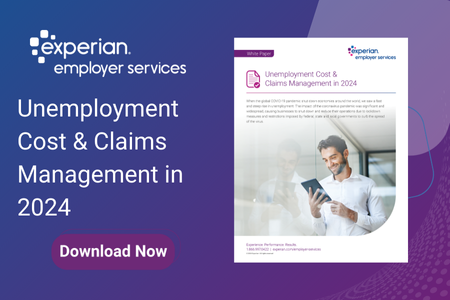
Individuals who lose their jobs through no fault of their own are eligible for unemployment insurance benefits. The term “lack of work” is often used to describe the reason for discharge upon which the UI benefits are almost certain. Lack of work could signal a discharge; however, it refers to when an employee is not working 40 hours per week. However, there are still situations which justify the denial of unemployment benefits. Employers should have a process to analyze and determine whether an unemployment claim is justified.
Some valid examples include:
- A company reorganization, reduction in force, or a position made redundant by the shutdown.
- The contract for a temporary or seasonal position has ended.
- Due to diminished business needs, the employer reduced the hours of an employee.
- Due to a natural disaster, a temporary layoff occurred.
The individual could be eligible for UI compensation in any of these cases. As an employer, you understand that this is what the UI program is for, and you pay unemployment insurance to federal and state funds as required by regulations. Keep reading to learn about situations when a claim is invalid, and how to proceed.

Grounds for Denial of Unemployment Benefits
Among the possible grounds on which to deny unemployment benefits, there are a few that could count as nonqualifiers. In other words, the circumstances and requirements necessary for a former employee to qualify for unemployment benefits have not been met.
This can happen if the length of employment or the so-called base period is too short to meet the requirement set by the state. In most states, employment lasting at least 12 months is required to meet the base period.
This is not everything – there are different ways in which states put forth the requirement of sufficient earnings as eligibility criteria for UI benefits. If the employee did not make sufficient earnings either during the entire base period or in the highest-paid quarter of it – the denial of unemployment benefits would be a certain outcome of a claim they have filed.
Additionally, the ineligibility for UI benefits extends to everyone who is self-employed: a contractor, a freelancer, or anyone for whose services the employer is not required to pay social security taxes.
When Should Employers Decide to Secure Denial of Unemployment Benefits
It is almost certain that the state agency will ensure the denial of unemployment benefits in cases when no sufficient length or earnings exist in the employee file. When it comes to determining the cause of separation or establishing other grounds for denial, things may not be that easy. The employer must show special adeptness and decide to react to claims filed on grounds they believe are unjustified.
Employee Quit Without Good Cause
If the employee quits their job voluntarily, either by signing a resignation letter or simply by abandoning their position, and no good reason is given for such an act, they cannot claim UI benefits. As an employer, you do not have only the incentive, but also the obligation to react and protest a claim filed in a case like this.
Employee Fired for Misconduct
Another reason to be alerted as an employer is when you receive a notice of the UI claim an employee fired for misconduct has filed. Provided you ensured all the necessary steps to implement the best practices in managing the unemployment insurance costs, protesting this type of claim would have a positive outcome for you. This does not mean, however, that it will be straightforward. Make sure you can provide sufficient evidence and reliable firsthand witnesses, and prepare thoroughly to leave no room for different interpretations at a UI hearing.
Employee Provided False Information
When filing the UI claim, the employee may provide inaccurate information. It could be misleading, false, or just sloppy and inadequate. In any case, keep an eye on even a minor inconsistency that may lead to the denial of unemployment benefits if proven as faulty on their compensation application.
Unable to Work or Not Ready to Work
A common reason for denial of unemployment benefits is if an employee is unable, ready and willing to accept a suitable job similar to their previous role. Unemployed individuals need to be able to work as soon as an offer of suitable work is extended to them, and failing to be ready can cause them to be denied unemployment benefits.
Rejecting an Offer of Suitable Work
Another reason for denial of unemployment benefits is if an employee rejects an offer of suitable work. If a person refuses an offer of suitable employment without a valid reason, they might be denied unemployment benefits. While the definition of “suitable work” can vary, it typically refers to jobs of similar skill level, pay and working conditions as the employee’s previous employment.
Causes for Denial of Unemployment Benefits After Termination of Employment
What happens after the termination of employment is not usually something an employer could in any way influence. However, the approval or denial of UI benefits may depend on factors such as the attitude of the claimant in between the jobs. They need to prove that they:
- Are actively seeking work,
- Are available to work if offered a position
- Did not refuse a suitable job offer made in this period.
If any of these conditions have not been met, the UI benefits will not be granted. Similarly, even if they are, and the records show that the claimant either refused a suitable job or did not even look for one during the job hiatus, the benefits may, later on, be withdrawn.
UI Claims Entail Significant Costs but Could Bring Tangible Savings
Depending on the employer’s approach, UI claims may pose either a significant threat to the company’s budget or an opportunity to secure savings and rationalize expenditures. When considering a claim and whether or not to contest it, we advise caution and readiness for a course of action that will have the best outcome. Not every claim should be protested, and the costs of UI hearings should also be considered.
Still, accepting the UI claims as costs of doing business does not count as the best approach either. Whenever there are grounds to protest the claims, keep in mind your tax experience ratings, and do your due diligence to win the hearing. Successful UI management will help you decide when to proceed and how.
Frequently Asked Questions
What does denial of benefits mean?
The denial of unemployment benefits means the unemployment agency deemed an individual failed to meet the eligibility criteria to be granted unemployment benefits, which means they will not receive financial assistance through the unemployment program.
What happens when a claim is denied?
If an individual was denied unemployment benefits, they would typically receive a written notice that lists the reasons for denial. Additionally, this notice will provide the steps necessary to appeal the decision.
Can a decision be appealed if unemployment benefits are denied?
Yes, unemployed individuals can appeal the denial of unemployment benefits. They will present their case and provide any additional information or evidence supporting the case to receive unemployment benefits.
What is the time frame for filing an appeal?
The time frame for filing an appeal if an individual was denied unemployment benefits varies by jurisdiction. However, in many cases, the window for an appeal is typically short, spanning between 10 and 30 days in most scenarios from the date of the denial notice.
How is an appeal filed after denial of unemployment benefits?
The exact steps to file an appeal for denied unemployment benefits vary by jurisdiction, but a denial letter will typically list the instructions needed to make an appeal. In some cases, the individual may need to submit a written appeal letter explaining the situation and why the denial was wrong. In contrast, others may require documentation to be sent to the appropriate address or email the unemployment agency provides.
Can an employer attend the appeal hearing in person?
Yes, in many cases, the employer and employee have the right to attend the appeal hearing in person, where both sides can present their case and any evidence or documentation to support their claims.
What happens if the individual wins the appeal?
If the former employee wins the appeal, they will be granted the right to receive the unemployment benefits denied initially as long as they continue to meet the eligibility requirements.
What if a former employee loses the appeal?
If a former employee loses the appeal, the original decision to deny unemployment benefits will stand, and they will not receive any unemployment benefits for the period they’re contending.